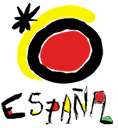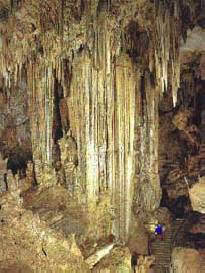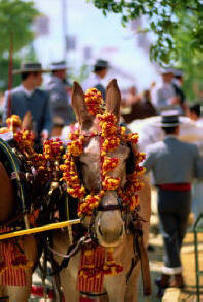
![]()
VillasDirect-Spain.co.uk
We want to make your stay a pleasure to remember
Nerja
Fisherman on Beach - Nerja Andalucia Spain
Nerja is on the seashore some 50 kilometres from Málaga on the N340 coastal highway, and marks the eastern tip of Málaga's Costa del Sol. Once a sleepy fishing village, the town now has a population of over 12,000.
Nerja has many things to attract the tourist, not least the Nerja Caves. These caves were found by accident some years ago by goat herders, the caves have since proven to be a great attraction due to their immense size.
Opening Dates and Times:
July-August:
Every day from 10.00 Hrs to 14.00 Hrs, and from 16.00 Hrs to 20.00 Hrs.
September-June:
Every day from 10.00 Hrs to 14.00 Hrs, and from 16.00 Hrs to 18.30 Hrs.
The Caves of Nerja are Situated 3 kilometres from Nerja town centre and
are well signposted.

Caves of Nerja
It is possible to explore some of the chambers and caverns that are not yet open to the public by joining a speleological group, consisting of a maximum 10 people over the age of 14. No special physical skills are necessary. For enquiries call the number below.
Scientists investigating cave fauna have recently discovered species that were thought to be extinct in the caves. Amongst these, in areas not open to the public, are scarab beetles and blind scorpions. Alberto Atinavt, department head at the University of Granada, is carrying out studies on the interior and exterior micro fauna of the cave. Cueva de Nerja, Maro, Nerja 29787 Tel: 952 529 520
Burriana beach with it's fresh sea food, bars, shops and restaurants is another great draw to visitors along with the world famous Balcon de Europa (Balcony of Europe)
The town has a large European population, this is
reflected in the variety of bars, shops, restaurants and hotels which go to make
Nerja one of the liveliest but classy towns in Andalusia
Nerja boasts 16 kilometres of beaches with powdery sand and sparkling clear
water. All major water sports are available here, including water skiing, scuba
diving and sailing.
Flanked by a dramatic mountain range, Sierra Almijara, to the east, the town
has, fortunately, managed to avoid being blighted by the concrete high-rise
scenario which has been the inevitable result of the tourist boom in some of the
coastal resorts. The old quarter of the town is still virtually unchanged with
narrow, winding streets, whitewashed houses with wrought iron terraces
overflowing with geraniums, on which a canary can sometimes be heard singing...
However, the heart of Nerja is its spectacular Balcón de Europa, the "Balcony of Europe", a magnificent promenade along the edge of a towering cliff, once the site of the great Moorish castle, with sweeping panoramic views of the Mediterranean and the small coves and beaches below, against an awesome backdrop of hazy blue mountains.
History
Balcón de Europa
The town's monuments include the 17th century Church of El Salvador, in a style which is a charming mixture of baroque and Moorish, or mudéjar, and the beautiful Gardens of Capistrano Playa, which descend to Burriana Beach.
However, Nerja's most spectacular attraction is undoubtedly its
fascinating caves, located just three kilometres from the centre of
town. They include archaeological treasures such as paintings over
20,000 years old and other pre-historic remains. One of the enormous
natural caverns has been transformed into a concert hall, where many
performances are staged during the summer. This year Nerja is
celebrating the 38th International Cave Festival, with the participation
of many top international entertainers
Gastronomy
There are plenty of restaurants and cafes here to choose from, and the visitor can hire a horse-drawn carriage to explore the most romantic corner of the town.
Nerja cuisine includes several specialities including De La Doncella (red mullet) and pescaito frito (fried fish) and ranging from top international cuisine to the ubiquitous sausage, eggs and chips!
Fiestas
The Spanish are famous for their celebrations, and Nerja is no exception to
this. Nerja is the host of many fiestas throughout the year, they are all well
worth seeing.
January
Middle of January – San Anton, Maro
February
Last two weeks in February – Carnaval
May
3rd May – Fiesta de la Cruz – Flowery altars all over the village in
honour of Saint Cross
15th May – Romeria San Isidro - Procession of the patron saint of the farmers from Iglesia (church) El Salvador to Nerja Caves, with popular dancing, traditional costumes etc.
June
23rd June – Noche de San Juan
July
16th July – Virgen del Carmen
Last week in July – Festival Cueva de Nerja
September
First weekend in September – Feria de las Maravillas
October
8th – 12th October – Feria Santos Patronos
How to get there

Fiestas throughout the year
Map and directions will be provide with Welcome Pack on arrival.